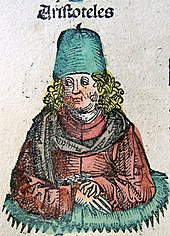Aristotle's treatment of the deliberative imagination is mentioned only very briefly in the course of his treatment of local motion. “The soul of animals,” says Aristotle, “is characterized by two faculties, the faculty of discrimination which is the work of thought and sense, and the faculty of originating local movement.” Having dealt with the former earlier in De Anima, Aristotle sets out to investigate the latter.
The first problem that presents itself is whether the originator of motion in an animal is a part of the soul or the whole soul. Given his earlier treatment of motion, it is evident that one part must be immovable and the other moved. Therefore the originator of movement is not the whole soul. But if the originator is a part of the soul, a difficulty arises--what are the parts of the soul? Different thinkers divide the soul differently, and different divisions may be made under differing aspects.
Aristotle begins by using his own classifications of the soul: the nutritive, the sensitive, the calculative, the imaginative, and the appetitive. Aristotle quickly disposes with the possibility that the nutritive aspect of the soul is the origin of motion. Local motion is always for an end, and the motion of nutrition seeks to perpetuate itself. Additionally, in the world of nature experience tells us that plants, which have only nutritive souls, do not move. This empirical refutation can be extended to the sensitive aspect of the soul as well, for some animals sense but do not exhibit forward motion.
Aristotle appeals to inner experience to deal with the calculative faculty. The mind is capable of considering something as pleasant or painful without the corresponding attraction or repulsion. For example, one may consider the ravages of war horrible, yet only know the horror in the abstract and not be emotionally moved. In another way, one may know that healthy behavior is good and will lead to happiness, and yet not engage in it. There is not a necessary connection between speculative knowledge and motion. Yet appetite too appears insufficient, for one may desire something, and action may be headed off by reason.
Forward motion seems to come about through an interplay of thought and appetite. Practical thought (as distinct from speculative thought) calculates means to an end, and results in action. Yet it is not possible for two things such as appetite and practical thought to begin motion; there would have to be one thing common to them both. Aristotle places movement in a single faculty, appetite, because even when thought initiates motion appetite is necessary. However the specifics of this interaction differ in the most complex animal to the most simple.
“Sensitive imagination,” says Aristotle “is found in all animals, deliberative imagination only in those that are calculative.” Not all animals have the types of minds that can calculate. What sets humans apart (though Aristotle does not specifically distinguish humans here) is that they are able to manipulate their imaginations, or more precisely, recognize their imaginations as imaginations. Humans are able to recognize that the images of things in the mind are images, and they are able to bring these images under a single criterion. In this way humans are not only driven by mindless desire, they are able to consider their desires, and order them by a single standard.
Deliberative imagination may be thought of in terms of a practical syllogism which contains a universal premise and a particular premise. In the syllogism the universal principle may be “one should be merciful to ones friends.” This has no practical connection to anything without the second premise “John is my friend.” Here the deliberative imagination determines John as my friend, and makes possible the conclusion, my being merciful to my friend. Deliberative imagination brings particulars under universals, making rational action possible. Therefore, local motion can result from reason in humans because humans have deliberative imagination.

No comments:
Post a Comment